Gender equality
Is a man who cooks for his wife submissive? Is a husband supposed to be "king of the house" or a caring partner? How far does a man have to go to prove his "manhood?"
In Burundi, husband Innocent came to the realisation that abusing and betraying his wife was ruining their lives.
They were already facing challenges as they were in the grips of poverty.
Innocent was preventing his wife Capitoline from not just being happy but from achieving her potential.
"When you do that, you hinder her development," he said.
Innocent's revelation turned his life upside down and for the better as he began to be part of the Abatangamuco.
The Abantagamuco is a group of former violent husbands that one day realised the harm they were inflicting on their wives and decided to redeem themselves.
Since 2008, they have been fighting against violence against women and championing gender equality in Burundi. This group was created with the CARE International, a development aid NGO that advocates for gender equality.
The Abatangamuco may not be on social networks, but they remain influential in their community.
We explore what the Abatangamuco's accomplished in this second episode of Cry Like A Boy, an original series by Euronews in collaboration with Africanews.
This podcast aims to promote a cross-border discussion on gender roles, from the perspective of five African countries (Burundi, Senegal, Lesotho, Guinea and Liberia). The journalists behind the project work with a network of local correspondents in the countries that are covered, as well as Africanews journalists.
In this episode, Norwegian gender researcher Hilde Ousland Vandeskog tells us about her first meeting with the Abatangamuco 10 years ago in Burundi and her surprise to witness how these men found the solution to rethink their masculinity, which could inspire men all around the world. This episode sheds light on what happens when a group of rural Burundian men begins to question their traditional ways of life.
You can listen and subscribe to the podcast on euronews.com or Castbox, Spotify, Apple, Google, Deezer.
THE ABATANGAMUCO IN BURUNDI: THE COUPLE - EPISODE 2
Danielle Olavario: Welcome to Cry Like a Boy, a Euronews original series and podcast that explores how the pressure to be ‘a man’ can destroy families and societies. Stay with us as we travel across the African continent to meet men who defy centuries-old stereotypes.
Today we continue the story of Innocent and Capitoline. We left them as Innocent decided to take on 27 lovers. Here’s what he remembers about that time:
Innocent Barumpozako: I became very poor after living with several women. In order to have enough to eat, I had to spend a whole day cultivating for others. But sometimes the people I worked for would only give me sweet potatoes after a long, hard day's work. The next day, a small amount of cassava flour. Poverty would seriously kill me.
Danielle Olavario: At that moment he was separated from his wife, he didn’t participate in the life of his community and became a social pariah. Here’s how the rest of the family lived the separation.
Capitoline Ndakoraniwe: When he chased me away, I was three months pregnant. I gave birth to the child at my home. When I was mistreated, my child was affected, until today he has never forgotten it.
He caught the kwashiorkor disease as a child. Because I had left him with his father. But his father spent all his time in adultery, the child was almost raised by his grandmother. Since he caught kwashi, the child has grown up traumatised. He was lonely, silent. Even when you asked him a question, he didn't answer.
He was very reserved, he was afraid of suffering the same violence as his mother.
Danielle Olavario: But then things took a turn for the better.
Innocent Barumpozako: One day I learned that a network called Abatangamuco was being created and I wanted to go and listen to what they were saying. At first, I thought they were crazy. I thought of them as men who were submissive to their wives. But when I joined this group, I was convinced that they were telling the truth. So I decided to abandon all the women I had seduced to bring my wife back home.
Capitoline Ndakoraniwe: When I came back, my husband had changed a bit. But not completely. He didn't know how to smile, we didn't speak. At all. He started talking to me when he joined the Abatangamuco group. That's when I saw his teeth when he was smiling ear to ear.
Danielle Olavario: Abatangamuco was created with the help of Care International, a humanitarian agency, focusing on a vast spectre of development issues, including gender inequality.
Josee Ntabahungu: The Abatangamuco is a movement of men committed to fighting violence against women and promoting gender equality. And they are, I would say, influential at the community level because the movement there is a community-based movement.
Danielle Olavario: This is Josee Ntabahungu. She works for Care and she was among those who helped establish the movement back in 2008.
Josee Ntabahungu: And they are interesting because they are men who were once violent. And they have done the bad things that are in the culture, the things of domination, and they have lived a hard life because of what they were doing as a lifestyle. And once changed. They're going to testify in the community by telling their story.
Danielle Olavario: After being founded, the Abatangamuco raised interest in the scientific world. In 2011 Hilde Vandeskog, a European gender researcher from Oslo University, came to Burundi to find out what made these men, who decided to challenge their own masculinity so unique. And according to her, it’s not because they were prepared to become “less of a man”.
Hilde Ousland Vandeskog: These are people who are like small, small scale subsistence farmers who have very little in terms of material security. And there seemed to be a dominant kind of idea of the Burundian masculinity that seemed to prevail in practice. And the way people live their lives was one where the man would ascertain his masculinity by being dominant and sometimes violent and also by not contributing. By having the right to not contribute to the house, including, in the fields or whatever, and the right to take money for his own pleasure and leave nothing for the family.
But that's not the only kind of idea of masculinity that exists in Burundi. These men would simultaneously talk about the importance of being prosperous. The importance of being successful. And, crucially, the importance of being trusted in the community.
So they (the Abatangamuco) basically took an idea of a better man that still existed in the Burundi society. And they put it forward.
Danielle Olavario: Hilde was also surprised by how simple and efficient the message was.
Hilde Ousland Vandeskog: And crucially, very much appealing to the man's interest. And in a way, to their vanity. It's like, don't you want to have a nicer house? Don't you want your wife to have nicer clothes? Don't you want people to look up to you? This would be the kind of thing.
And then it would go like. But if you do what you do, if you don't help your wife in the fields, if you beat her so that she's frightened and injured and everything. And if you don't draw from her intelligence as well to find the best way of spending money, then that's just got to be available to you. Like that was the argument.
Danielle Olavario: In the meantime, Capitoline and Innocent continue to live their lives as a respectable couple in their community. Today, Innocent is a leader there and his wife works alongside him. Innocent never raised a hand to his wife ever again. They now have one child who lives outside Burundi, in Uganda, and even a grandchild - in this part of the world, couples have babies very early.
And this is how they describe each other -- and their ideal partner now.
Capitoline Ndakoraniwe: My husband when he hadn't changed yet, he never showed me his money. He would barely give me a small bill to buy salt, he would have to hide to take the money out and throw me on the floor.
But today my husband has become a real man. He no longer hides his financial status from me. He communicates with me. Wherever he is, he is proud of his wife. My husband would never say my name. But today he calls me his sweetheart. Today, when we are together, we are very happy.
Innocent Barumpozako: There are men who keep a woman prisoner and prevent her from being autonomous. When you do that, you hinder her development. For example, my wife can sell a green banana at a higher price than I can. If I'm not around, I can let her sell our cattle because I know she sells better than I do. I trust her.
Danielle Olavario: Capitoline and Innocent are only one example. Abatangamuco has helped many couples learn to work together, and many men, to realise that they are capable of changing their vision of their own masculinity for a happy and more egalitarian marriage.
Faustin Ntiranyibagira: When I look around my community, couples are beginning to understand that home is for two. People no longer see a man drawing water and call him a submissive man. They don't see a woman assisting her husband and making fun of her.
Today, thanks to the Abatangamuco, couples can walk together, whereas, in the past, a woman could not walk beside her husband. Today, the man can do housework in the absence of his wife.
If all Burundians were mutangamuco, the country would see spectacular development.
Danielle Olavario: But not everyone agrees on the gender equality question...
The UN put Burundi in 185th place on the Gender Equality Index in 2019.
And traditional gender roles are deeply set in Burundian society. There is a Kirundi word to describe a woman - umukenyezi. The poetic translation is “the one who ties her loincloth on thorns and walks without flinching so that the outside world doesn’t notice her pain”. For Burundian women, it means to endure all burdens of marriage silently.
There are no comprehensive statistics on gender-based violence in Burundi. In 2017 UNAIDS published a report in which they collected all available data from different organisations. According to this data, from 2015 to 2016 the number of offences against women, including homicides, increased by 150 and 200 per cent respectively. In fact, there is still a big debate in the country on the role of men and women. Even Burundi’s first lady Angeline Ndayishimiye in a video that circulated on social media recently said that men and women will never be equal.
Angeline Ndayishimiye: We realised that there is an evil spirit of rebellion that has attacked women who have money in their pockets. It depends on how everyone has been educated... There is also what was said by the Minister of Justice, who also gave us advice. She spoke about gender equality; it will never happen, it will never succeed and you will never see it. I will give you a small example: when you sit next to a man, who is not even your husband, and when it is difficult for you to open even a bottle of water, you ask him to open it for you. Why don't you open it yourself? This is an example that proves that gender equality is to be forgotten! In Burundi, it will never happen...
Danielle Olavario: But the success of programs like Abatangamuco show that change is happening. In 2016 Burundian authorities adopted a law against gender-based violence, toughening penalties for abusers and the NGOs report that the number of cases is slowly going down.
The Burundian constitution requires 30% of women present in governing. Even if not all institutions have reached this goal, 2020 elections saw more women elected for local governments and 36% of women elected in the National Assembly. On average women make 34,45% of all members of local councils in Burundi. In 2015 this number was 32,7%.
All the changes that happened when men reconsidered their masculinity within their relationships, going from traditional patriarchal controlling roles to a more egalitarian model where both genders have a say in the day to day of their lives together. Here’s Hilde again:
Hilde Ousland Vandeskog: I think we all have very set ideas about gender roles and how we should live as families and just as human beings towards each other. And these men’s willingness to question their own ideas of masculinity and question their own dominance is, I think, something we don't do enough.
And I'm not going to say that they have arrived at perfect gender equality. I mean, if you look at those families, they would still look very traditional. It would still be, like, this is the wife's main responsibility and this is the husbands. But they would collaborate to make it work, which is a huge step forward from where they came from.
But just that humility in times like, you know what, I was probably wrong. Let's see if we can do it differently. Let's challenge that and let's make that reflection a part of our identity and our stories about ourselves. That's something I think we can learn from.
Danielle Olavario: Localized efforts like Abatangamuco gives hope that real change can happen. Back in Gasunu we ask the villagers what they think of the way Capitoline and Innocent allow for a more equal balance in their marriage.
After the sketch is over, audience members laugh and discuss their favourite parts. They feel connected to the story and see themselves in it. They listen and take on messages for future generations of boys and young men.
Woman in the audience: Forgive her, forgive her!
Danielle Olavario: Innocent and Capitoline’s grandson is a young man of 18 and dreams of a future family, just like his grandparents.
Believe Bitangimana: To hear the stories of some of my classmates, their parents are living in misunderstanding. Their fathers are often drunk and squander the family's wealth. They are completely contrary to my grandparents. Here at home, everything is going well. My grandparents are even role models in our community.
When I have my family, I would like to have a happy and peaceful home like my grandparents'. A home where people help each other. I'd even like to inspire my friends.
Thanks for listening. The next episode will be out in two weeks time.
For more information on Cry Like a Boy, a Euronews original series and podcast go to euronews.com/cry-like-a-boy to find opinion pieces, videos and articles on the topic. Follow us @euronews on Twitter and euronews.tv on Instagram.
Share with us your own stories of how you changed and challenged your view on what it means to be a man, use #crylikeaboy. If you’re a French speaker, this podcast is also available in French: Dans la Tête des Hommes.



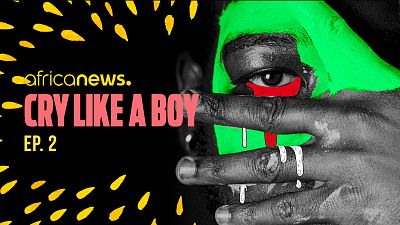



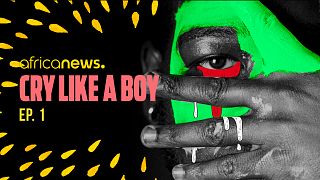

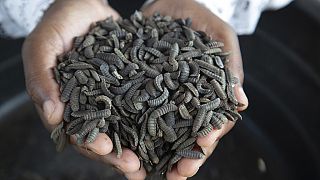
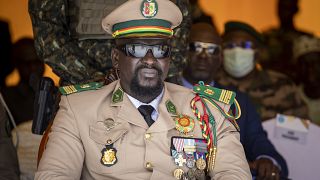
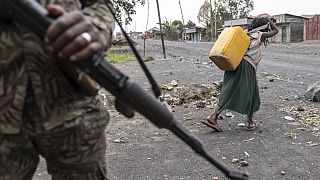
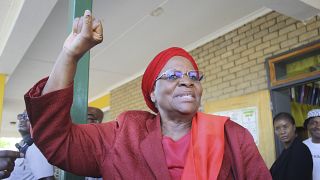
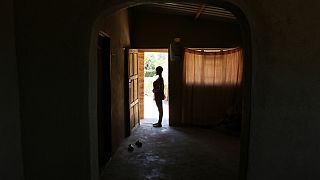
01:56
Dozens of young Burundians expelled from Tanzania in recent months
01:10
Prince William honors conservation heroes at Tusk Awards in London
01:35
Kenyan police use teargas to disperse anti-femicide protesters in Nairobi
Go to video
Zimbabwe seeks debt restructuring to unlock funding and rebuild economy
01:37
Record participation at 24th Sofi Great Ethiopian Run
11:05
Africa's hight cost of climate change [Business Africa]